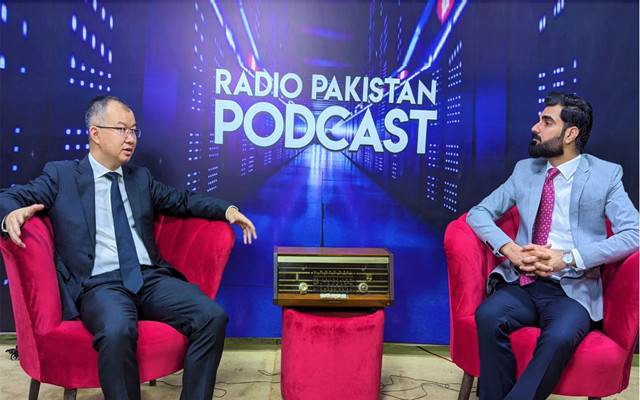
Chinese Science Commissioner to Pakistan, Yin Shengxin, has expressed optimism about the future of science and technology (S&T) cooperation between China and Pakistan.
Speaking during an exclusive interview with Radio Pakistan's Technology FM Channel, Yin highlighted the potential for collaboration in fields such as artificial intelligence (AI), agriculture, information technology, and renewable energy.
Yin emphasised the significant impact of AI integration in the Chinese corporate sector, which played a crucial role in lifting the Chinese economy from 228 billion Yuan to a remarkable 23,000 billion Yuan over the past decade. He also shared notable Chinese achievements in the field of science and technology, including the Chinese Space Mission, Beidou Navigation System, and Chinese bullet train projects.
In response to the question on how both countries can benefit from S&T cooperation, Yin stressed the importance of conducting cooperation based on the well-being of the people of both nations and following the principle of win-win.
He highlighted fields such as agriculture, renewable energy, bio-medicine, and the environment, emphasising their significance to the lives of the Pakistani people. He stated that successful cooperation would enhance Pakistan's S&T capacities, improve living standards, and bring benefits to society.
Also read: Pakistan, China set up S&T centre
Simultaneously, Chinese partners stand to gain by enhancing their technological capabilities, iterating products, and expanding technological applications through this collaboration.
Yin shared his vision for S&T cooperation between China and Pakistan, emphasising the longstanding friendship and all-weather strategic partnership between the two countries as a solid foundation.
As both nations share common demands and understanding in terms of technological development, Yin expressed confidence in the enormous potential for collaboration. He highlighted the favourable conditions and environment created through initiatives such as Belt and Road cooperation, the China-Pakistan Economic Corridor (CPEC), and inter-governmental S&T cooperation mechanisms.
Yin also noted the increasing number of Chinese research institutes, universities, and companies dedicated to S&T cooperation with Pakistan, which he believes will contribute to a promising future of collaboration.
Regarding China's advancements in S&T, Yin provided insights into the dynamic changes and progress made. He highlighted significant increases in the number of invention patents granted, the revenue of high-tech industries, and China's ranking in the Global Innovation Index 2022. Yin attributed these achievements to the substantial support and emphasis from the Chinese government, which has unveiled strategies and policies to drive innovation-driven development and increase investment in research and development.
Yin discussed how China fostered research and development in emerging fields such as AI, biotechnology, agriculture, and renewable energy. He cited the tremendous demand for AI since 2010, leading to dedicated efforts by Chinese companies, universities, and institutes in AI research. China's regulation of AI development was also highlighted as a critical factor in fostering its growth.
Also read: Sino-Pak tech centre launched in Beijing to bolster bilateral ties
Yin outlined the mechanisms in place to promote S&T cooperation between China and Pakistan, including the China-Pakistan Joint Committee on Science and Technology and the CPEC S&T Joint Working Group. He also highlighted the role of the Belt and Road Initiative in enhancing scientific and technological collaboration between the two countries, through initiatives such as S&T People-to-People Exchange, Joint Laboratory, Science Park Cooperation, and Technology Transfer.
The interview concluded with a discussion on the positive impact of technology on the lives of Chinese people. Yin shared personal experiences and highlighted examples such as improved transportation systems, distance learning opportunities, and enhanced connectivity through instant messaging. He emphasised that technology has significantly transformed the lives of the Chinese people in various aspects, showcasing the potential for similar positive changes in Pakistan through S&T cooperation with China.
Yin also visited various sections of Radio Pakistan Islamabad and appreciated the working of state media, further strengthening the ties between China and Pakistan. With both countries committed to enhancing cooperation in science and technology, the future holds tremendous promise for mutual benefit and progress in various fields.





















COMMENTS (1)
Comments are moderated and generally will be posted if they are on-topic and not abusive.
For more information, please see our Comments FAQ